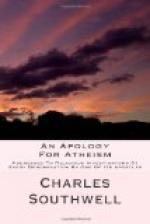The fourth dogma is not questioned by Atheists, as they are quite convinced that it is not possible for us to comprehend the substance or essence of an immaterial Being.
The other dogmas we need not enlarge upon, as they are little more than repetitions or expansions of the preceding one. Indeed, much of the foregoing would be superfluous, were it not that it serves to illustrate, so completely and clearly, Theistical absurdities. The only dogma worth overturning, of the eight here noticed, is the first, for if that fall, the rest must fall with it. If, for example, the reader is convinced that it is more probable matter is mutable as regards form, but eternal as regards essence, than that it was willed into existence by a Being said to be eternal and immutable, he at once becomes an Atheist—for if matter always was, no Being could have been before it, nor can any exist after it. It is because men in general are shocked at the idea of matter without beginning and without end, that they so readily embrace the idea of a God, forgetting that if the idea of eternal matter shock our sense of the probable, the idea of an eternal Being who existed before matter, if well considered, is sufficient to shock all sense of the possible.
The man who is contented with the universe, who stops at that has at least the satisfaction of dealing with something tangible—but he who don’t find the universe large enough for him to expatiate in, and whirls his brains into a belief that there is a necessarily existing something beyond the limits of a world unlimited, is in a mental condition no reasonable man need envy.
Of the universe, or at least so much of it as our senses have been operated upon by, we have conceptions clear, vivid, and distinct; but when Dr. Clarke tells us of an intelligent Being, not part but creator of that universe, we can form no clear, vivid, distinct, or, in point of fact, any conception of such a Being. When he explains that it is infinite and omnipresent, like poor Paddy’s famed ale, the explanation ‘thickens as it clears;’ for being ourselves finite, and necessarily present on one small spot of our very small planet, the words infinite and omnipresent do not suggest to us either positive or practical ideas—of course, therefore, we have neither positive nor practical ideas of an infinite and omnipresent Being.
We can as easily understand that the universe ever did exist, as we now understand that it does exist—but we cannot conceive its absence for the millionth part of an instant—and really it puzzles one to conceive what those people can be dreaming about who talk as familiarly about the extinction of a universe as the chemist does of extinguishing the flame of his spirit-lamp.




